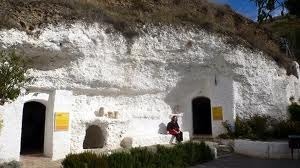THE CAVES OF SACROMONTE
 Upon an invitation to lecture at the University of Alicante, I decided it was high time to take a lengthy tour of the south of Spain. The cities crossed by García Lorca’s beloved rivers exerted an irresistible fascination on my wanderlust, for three cultures –Muslim, Jew, and Catholic– had coexisted in them long before the reunification of the country destroyed tolerance and friendship in one of the most advanced corners of the world.
Upon an invitation to lecture at the University of Alicante, I decided it was high time to take a lengthy tour of the south of Spain. The cities crossed by García Lorca’s beloved rivers exerted an irresistible fascination on my wanderlust, for three cultures –Muslim, Jew, and Catholic– had coexisted in them long before the reunification of the country destroyed tolerance and friendship in one of the most advanced corners of the world.
My plane landed in Madrid at 6 AM… and I landed with my full weight on my right leg at the bottom of the escalator leading to the baggage area. Why I lost my balance remains a mystery. The airport might have been borrowed from a story by Bradbury. Not a living soul except us passengers, steered this way and that by impersonal voices blaring out of loudspeakers. Caring hands helped me to my feet, others retrieved my suitcase, and a kind gentleman put me in a taxi, advising me to have the leg examined as soon as I arrived at the hotel.
It turned out that good hotels provided medical services, so I was whisked off to hospital in an ambulance, given an X-ray, and assured there was nothing wrong with my leg, but… how I dreaded that “but”! I should take things easy and refrain from walking. It goes without saying that my mind rebelled against the doctor’s wise words. I had come to walk the cobbled streets of the south, and walk I would, whatever the cost.
Well, I paid full price. When I reached Granada, both my legs had swollen to an elephantiasic size. “Overcompensation,” diagnosed the local doctor. “You’ve lain heavily on your left leg to ease the pain, and now the two of them are suffering the consequences. Do yourself a favor: get a wheelchair.”
Second only to the magic Alhambra, the caves of Sacromonte, home of the gypsies at the top of an impressive hill, could be reached by bus. I found it weird that one and the same bus jolted up and down the meandering road several times a day. “Each country has its ways,” I thought, and limped to the bus stop after finding out at what time it was expected so as not to stand longer than my poor legs allowed. To my relief, there was an empty seat just two steps away from the door. My attention soon shifted from the variegated landscape to the exchanges on the bus. Apparently, everyone knew everyone else, since they all caught the bus at the same hour day in day out. “Juana,¡qué guapa estás hoy!” (a compliment) shouted a bald, stout middle-aged man from the back, and Juana’s sister, as I learnt from the conversation that ensued, shouted back that the pretty, raven-black haired girl with glowing green eyes was on her way to a flamenco dancing audition at the caves. These people shared their latest news in the most natural way, offering hope, congratulations, encouragement, or condolences depending on the topic under discussion. The young expecting mother sitting next to me asked, “Do you mind if I open the window?” My accent gave me away as a foreigner, and I suddenly became the center of attention.
Where was I coming from? Oh, Argentina, the generous country that had welcomed so many Spanish migrants in Franco’s day (and before and after, I said to myself.) Was I going to spend the day at the caves? Perhaps take a flamenco lesson? I really didn’t feel like explaining, but what to do in the face of such genuine interest? I told them about my legs. “You see, I won’t even get off the bus. I’m returning to the plaza when it turns back.”
My neighbor called out to the driver, “Pepe, we have a nice Argentinian lady here who’s come from afar to visit the caves but is temporarily impaired. Please walk her down to the caves, will you? It would be a shame if she’d have to go back without taking at least a look round.”
Pepe’s objections that he’d run behind schedule drowned in the indignant voices seconding the young future mother’s request. He acquiesced, and I made my descent into the caves led by his strong hands. It was an unforgettable experience, yet my memory cherishes what happened on the way back. Long lines of angry people reproached Pepe for his tardiness, only to change to a sympathetic mood once they learnt his reasons. He had done the right thing, they agreed, smiling at me and wishing me a prompt recovery. At my stop, amid cheers and good wishes, Pepe parked by the curb to see me to the hotel door.
Such a wonderful lesson in solidarity warms my heart to this day.
MARTA MERAJVER-KURLAT
Buenos Aires, August 2013
http://www.martamerajver.com.ar/marta/
http://www.amazon.com/Marta-Merajver-Kurlat/e/B009TC8C5A
Cherrye S. Vasquez's Blog
- Cherrye S. Vasquez's profile
- 37 followers



